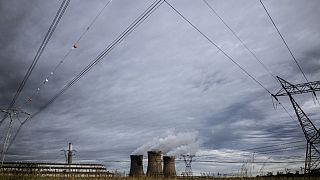South Africa
Air quality in South Africa has come under the spotlight once again and the city of Johannesburg has called for an investigation into a heavy sulphur-like smell that filled the air this week.
Last year the stench was believed to be the result of elevated levels of sulphur dioxide and hydrogen sulphide from a fuels plant in Mpumalanga.
Experts say it's a form of pollution adding to an already growing problem._"We are receiving quite a few complaints from even our residents about having smells in the air, almost like a rotten egg sulphur smell. And this is indicative of the pollution being quite high in the area._Even if they're saying that it's not dangerous, it's not toxic, the chemicals generally in air pollution, most of the pollutants will cause some sort of health effects," said Raeesa Moolla, a senior lecturer of Meteorology, Air Quality, Environmental Health Risk at the University of the Witwatersrand.
According to recent studies, the high air pollution levels in Johannesburg has reduced life expectancy by 3.2 years. Children in particular are at greater risk.
"Pollution irritates your inflammatory response in your tissues. It contributes to a lot of disease, cardiopulmonary disease, ischemic heart disease and strokes, for example, chronic obstructive pulmonary disease, asthma, lower respiratory tract infection and lung cancer. We're seeing an increase in asthma in children at the moment. We are also seeing an exacerbation in adolescents and adults that would have been okay for a few years, so we see worsening symptoms in that population. South Africa is ranked fifth in the world for Asthma mortality, so the numbers are high," said Dafni Zisis, general practitioner of the EXP Medical Center.
Transportation has become one of the biggest contributors to pollution in South Africa. There are over five million cars on the roads in Johannesburg alone, each one of them emitting several dangerous gases into the air.
"A lot of the systems are either using older technologies, or the refueling systems are not up to date. So, what tends to happen is that from our vehicles, from our buses from our trucks, we have a lot of transport pollution, because also people are very dependent on personal transport we have a higher car usage, so we have a lot of traffic emissions," said Moolla.
"We had very little RSV (respiratory syncytial viral) and influenza, especially the first year of lockdown. We were very quiet in terms of disease and I think it was because of the lockdown. There was less traffic on the road, people were at home," said Zisis.
The South Africa Air Quality Index currently shows a PM 2.5 level for the country. This is 1.4 times above the levels recommended by the World Health Organization.
"A lot of the studies we do look at, we actually take into account the local burden of disease and the impact, it has an economic impact, it also has a social impact, not only does it impact your health, but it then places pressure on the health systems which are already quite strained in our country. We definitely need a more vigorous response. In South Africa we have very good environmental management acts. However, the enforcement and monitoring of it isn't conducted very well," said Moolla.
Studies show that developed countries have plateaued in terms of pollution while developing countries like South Africa are recording increasing levels of dirty air.











00:50
Ons Jabeur retires from Wimbledon Opener due to breathing issues
11:15
AI drones lead breakthrough against malaria in Africa [Business Africa]
01:29
Experts warn of danger of exercising in extreme heat and humidity
Go to video
Over 40 killed in attack on Sudanese hospital: WHO Chief condemns “Appalling” strike
01:15
Morocco says 2024 was the hottest year with temperatures reaching 47.7 degrees
Go to video
Ghana confirms 34 new Mpox cases, total rises to 79